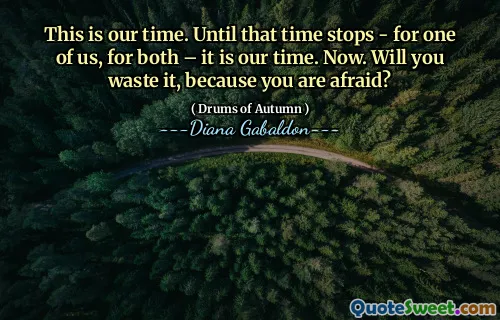Whereas," I chipped in, leaning forward and raising my own voice enough to be heard over the clop and creak of the horses, "if harm comes to them because of some man, the satisfaction of blaming him will be adequate compensation?
In "Drums of Autumn" by Diana Gabaldon, a character expresses a concern about the potential harm that could come to others due to the actions of a man. This reveals a deeper philosophical question about justice and accountability. The character suggests that while it is tempting to seek satisfaction in blaming someone for wrongdoing, such feelings might not truly address the consequences of the harm caused. This moment encapsulates a significant theme in the narrative: the complex interplay between personal responsibility and the moral implications of one's actions. Ultimately, it raises a poignant question about whether retribution can ever truly compensate for the suffering caused, calling into focus the characters' struggles with morality and the impacts of their choices on those around them.
In "Drums of Autumn" by Diana Gabaldon, a character expresses a concern about the potential harm that could come to others due to the actions of a man. This reveals a deeper philosophical question about justice and accountability. The character suggests that while it is tempting to seek satisfaction in blaming someone for wrongdoing, such feelings might not truly address the consequences of the harm caused.
This moment encapsulates a significant theme in the narrative: the complex interplay between personal responsibility and the moral implications of one's actions. Ultimately, it raises a poignant question about whether retribution can ever truly compensate for the suffering caused, calling into focus the characters' struggles with morality and the impacts of their choices on those around them.






